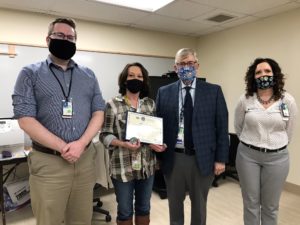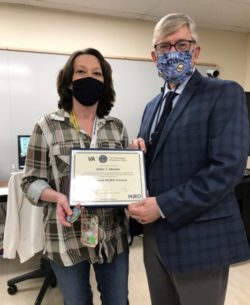BECKLEY, WV — Not long ago, it wasn’t unheard of for Billie Shields to get called in the middle of the night to come into the Beckley VAMC and work up a blood culture on a patient. She was happy to do it—as a supervisor laboratory technician, she takes the role of serving veterans seriously.
But too often the microorganism that was thought to come from the patient’s blood was actually the result of contamination during the blood-taking process. The level of false positives due to contamination sometimes rose as high as 5%. False positives in blood cultures do occur, but the national benchmark is 3%, and Shields was determined to find a way to lower the rate in her lab.
Shields didn’t always think she wanted to spend her life in the lab. She discovered the job during her time with the National Guard and received her degree while serving. But afterward, she went on to take business and management classes.
“I didn’t think I wanted to stay in the lab,” she explained. “But it turns out it’s my passion. Sometimes you don’t realize it’s your passion until you get your feet wet in it.”
After working at what she said was probably every private sector facility in southern West Virginia, she came to the Beckley VAMC in December 2016.
“It gives you a great sense of pride coming to work knowing you’re taking care of people who helped you know freedom,” she said.
As a supervisor in the microbiology group, she examines microorganisms and blood cultures to aid doctors and pharmacists in making the right diagnoses and providing the right medications.
 “The reason I like it so much is because it’s one of the jobs in the lab that’s still hands-on,” she declared. “I like to be hands-on.”
“The reason I like it so much is because it’s one of the jobs in the lab that’s still hands-on,” she declared. “I like to be hands-on.”
When she arrived at Beckley, the contamination rate was well over the benchmark. Most of that, she discovered, was due to improper collection of blood samples. Bacteria that had been on the skin of the patient made its way into the sample and set off alarms when it was processed.
The false positive was problematic for the hospital staff, but it was the patients who bore the biggest burden.
“When you don’t do it right and you have that contamination, a patient gets admitted who doesn’t need to be,” Shields explained. “They were admitting these people and giving them antibiotics when they didn’t need to be given antibiotics.”
So Shields looked for a solution. Part of the problem was in cleaning the patient, but another issue was that nurses weren’t collecting blood directly into the sample bottle. There was an intermediary tube involved.
“There was a lot of transferring from one place to another,” Shields said.
Shields didn’t expect to find a quick solution and was surprised when she came upon one in the Steripath diversion device. The device diverts and sequesters the first 1.5ml of blood—the volume known to contain transfer contaminants. The rest of the blood is then collected through a second path, creating a closed patient-to-bottle collection system.
Once she’d found a potential solution, she didn’t expect the hospital to go for it.
“It’s really expensive,” she said. “I’m not sure how much they pay for each needle—each is in its own sterile container. But we were spending a whole lot more when we were admitting people who weren’t supposed to be admitted.”
To her surprise, facility leaders decided to try her idea for six months and review the results. Those results were clear and immediate—a drastic drop in contaminated samples. These days the contamination rate in Shields’ lab rarely makes it to 1%.
“We do 300 cultures a month and we might have one that’s contaminated,” she said. “For the last two months, I’ve been at zero.”
In March, Shields was honored with VA’s National HeRO Award for her contributions to making the VA a safer, more reliable healthcare system. Beckley staff have put together a presentation on their findings and have presented it to VA leadership in case other VA facilities with contamination issues are in search of a solution.
“I never dreamed it would take off and do what it has done. I was skeptical myself,” Shields declared. “I haven’t been called in the middle of the night in a long time.”



